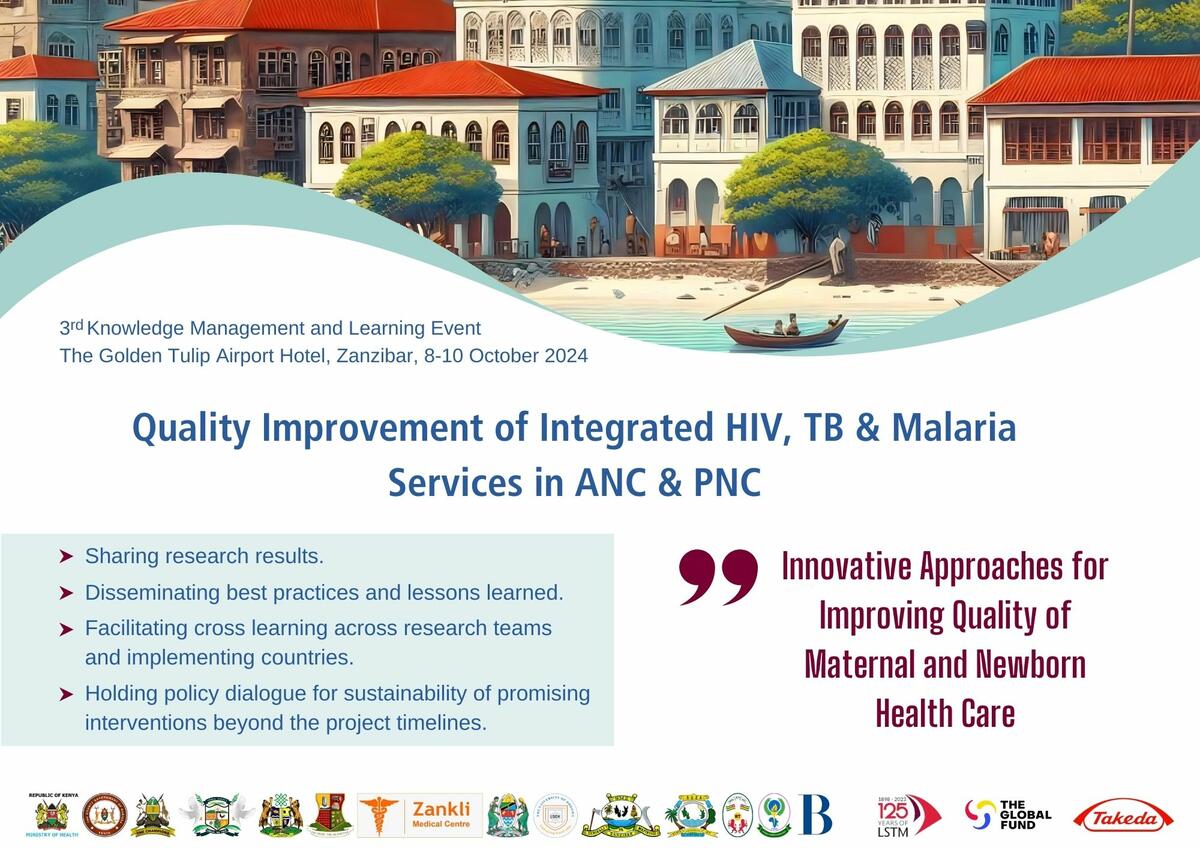
Third Knowledge Management and Learning Event
Quality Improvement of Integrated HIV, TB and Malaria Services in ANC&PNC
Overview
Annual Knowledge Management and Learning (KML) events were introduced under the "Quality Improvement of Integrated HIV, TB and Malaria Services in ANC/PNC" programme in 2022. These events provide an opportunity to highlight programme results, share lessons learned across teams and key stakeholders in supported countries and plan for subsequent programme years. These events complement the continuous engagement of programme implementation teams at national and subnational levels with key maternal and newborn health (MNH) stakeholders led by the Ministries of Health (MoH).
The third and final KML event was held in Zanzibar from October 8 to 10, 2024 and hosted by the local implementing partner, the State University of Zanzibar.

Stakeholder groups and participants
The success of the 3rd KML was made possible by the collective efforts and commitment of a diverse group of stakeholders. These stakeholders have played critical roles in driving the shared mission of improving maternal and newborn health outcomes across the region by facilitating knowledge exchange, sharing best practices, and demonstrating the impact of sustainable partnerships. The event hosted a total of 79 participants, including:
- Ministry of Health Representatives from Kenya, Tanzania mainland, Zanzibar, and Nigeria highlighting the critical role of national and subnational governments in shaping and implementing policies that directly impact maternal and child health
- Funding and implementation partners who have brought their expertise, resources, and commitment to improving health outcomes for women and children - Global Fund, Takeda, State University of Zanzibar (SUZA), University of Dodoma (UDOM), and LSTM (UK, Kenya, and Nigeria)
- Minister of Health and First Lady of Zanzibar as key leaders representing the host country
- Healthcare workers and service providers from Kenya, Tanzania mainland, Zanzibar, and Nigeria
Lessons Learned, Sustaining and Amplifying Impact
In three panel discussions the participants delved into critical areas for advancing maternal and newborn health through sustained interventions, effective institutional research, and innovative program design. The discussions focused on scaling up health worker capacity, strengthening institutional research and project management, and designing future-proof programs to maximise health impact. With experts from Kenya, Tanzania, Nigeria, and Zanzibar, the session provided valuable insights into the challenges and strategies for building resilient health systems and improving service delivery in resource-constrained settings.

Conclusions and Future Outlook
The three-day discussions and proceedings of the KML revealed that data-driven decision-making, community engagement, and the integration of essential services are crucial to improving service delivery and maternal health outcomes. While sustainability remains challenging, integrated maternal and child health interventions are well-positioned for long-term impact with government ownership, ongoing mentorship, and robust monitoring systems.
The research findings shared at the KML provided critical insights into the challenges and solutions for improving ANC/PNC services in LMICs. PhD candidate systematic reviews highlighted the need for comprehensive approaches that integrate quality care assessments, address mental health and social determinants, and leverage innovative training methods like blended learning. The findings also reinforced the importance of standardised metrics for evaluating the quality of care and the integration of mental health and domestic abuse services into routine maternal care. These insights are essential for shaping future interventions and ensuring that maternal health services are effective, accessible, and sustainable long-term.
The presentations and discussions highlighted the positive impact of quality improvement interventions on maternal and newborn health services, through blended learning training for health workers and the integration of infectious disease screenings. Programme results demonstrated measurable improvements in key health indicators such as ANC attendance, PNC follow-up, and the integration of HIV, TB, and malaria testing. However, challenges such as staff turnover, resource shortages, and technical issues must be addressed to ensure the sustainability and scalability of these improvements. Continuous stakeholder feedback, a robust monitoring and evaluation framework, and integrating evidence-based practices are essential to drive further improvements in maternal and newborn health outcomes.
Other key takeaways highlighted the importance of standardised service indicators and the need for culturally sensitive and systemically integrated approaches to addressing domestic abuse.
It is vital to scale health worker capacity, strengthen institutional research, and design innovative programmes that address immediate and long-term maternal and newborn health needs while addressing community engagement, sustainable capacity-building efforts, and alignment between research, policy, and practice.
Future programmes can improve health service delivery by leveraging partnerships, strengthening pre-service and in-service training, and fostering local ownership. The KML discussions also emphasised the need for continuous adaptation and innovation in response to evolving health challenges, ensuring that maternal and newborn health programmes remain effective and sustainable.